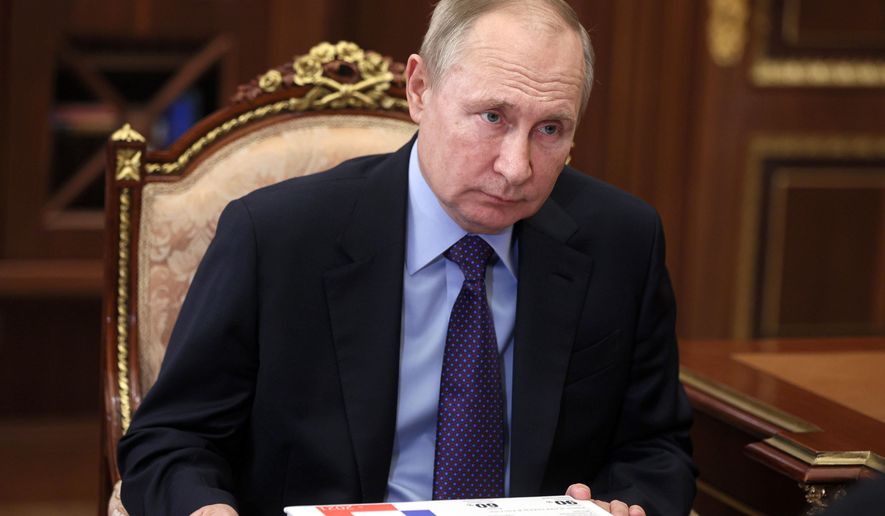Russian President Vladimir Putin’s tough talk and threatening military buildup on Ukraine’s border could backfire and result in the one thing he says he doesn’t want: an expansion of NATO to more countries on Russia’s doorstep.
While Mr. Putin is seeking guarantees from the West that Ukraine and others not be allowed to join the Western military alliance, some countries in the region that long shunned NATO membership in favor of a policy of neutrality are reconsidering purely as a response to Russia’s aggressive posturing.
Most notably, top officials in Finland in recent days have forcefully asserted that Helsinki has a right to apply for NATO membership, regardless of how Moscow feels about it. Sweden’s more conservative parties also have edged closer to NATO in recent years, and elections this spring could bring the question new prominence.
Following a shift in policy by a far-right party, Sweden’s parliament formally adopted a “NATO option” motion on a 204-145 vote last month. The option allows the Riksdag to consider applying for membership sometime in the future. The measure passed over the strong opposition of the minority government, led by center-left parties.
The motion does not force the government to act, but “we can now expect a more comprehensive political debate about an eventual Swedish membership,” Calle Hakansson, an analyst at the Swedish Institute of International Affairs, told public service television, according to a report by Politico Europe.
Finland and Sweden already have positive diplomatic relations with the alliance, but both have long been firm in their autonomy as militarily nonaligned countries, in part for fear of provoking Moscow.
However, Finnish President Sauli Niinisto and Prime Minister Sanna Marin used their official New Year’s addresses to stress that Finland has the option of seeking NATO membership at any time, regardless of what security “guarantees” the Kremlin is seeking.
According to the online publication BrusselsMorning, Mr. Niinisto said Finland has “room to maneuver and freedom of choice” that includes “the possibility of military alignment and of applying for NATO membership, should we ourselves so decide.”
Ms. Marin said Finland has “learnt from the past,” an apparent reference to Helsinki’s troubled history with Moscow dating back to the Soviet Union’s annexation of Western Karelia from Finland during the 1939-1940 Russo-Finnish war.
Unease over that history has been rekindled among Finnish nationalists since Russia’s similarly forceful annexation of the Crimean Peninsula from Ukraine in 2014. Sweden’s pro-NATO voices say the country’s long-cherished policy of neutrality has left it in no man’s land in the face of Russia’s resurgent foreign policy aggression in the Putin era. The aggression has included provocations aimed directly at Stockholm.
“For Sweden, one of the first wake-up calls of a resurgent Russia was the simulated nuclear attack on Sweden by Russian bombers on the night of Easter Friday in 2013,” according to 2016 commentary written by then-Swedish Air Force Maj. Carl Bergqvist.
The commentary, published in the online journal War on the Rocks, noted that the Russian posturing had prompted Sweden and Finland to sign “host-nation support agreements with NATO to speed up the process of hosting NATO forces when needed.”
In August, Swedish troops were hastily sent to the island of Gotland in the Baltic Sea after Russian warships were spotted in the area.
Mixed public opinion is a factor in both countries. Polls find that Swedes are equally divided over the wisdom of joining NATO, but pollsters have found a major shift from the 1990s, when a strong majority opposed membership. A recent Finnish poll found a plurality — 40% — still oppose NATO membership to 26% in support, but pro-NATO sentiment is on the rise.
Even before the New Year’s speeches by the Finnish president and prime minister, Russia voiced frustration that Finland or Sweden might try to join NATO.
“It is quite obvious that the ascension of Finland and Sweden to NATO would have serious military and political consequences that would require an adequate response from Russia,” Russian Foreign Ministry spokeswoman Maria Zakharova said on Dec. 29, according to EU Today.
The back-and-forth comes amid rising concern in the U.S. and NATO that Russia may be on the verge of invading Ukraine. Russia has been building up its military troop along the Ukrainian border.
The buildup, which has triggered U.S.-backed Ukrainian forces to dig in on their side of the border, has created a foreign policy headache for the Biden administration.
Moscow has even test-fired hypersonic missiles to underscore its demand that the West provide guarantees that NATO not expand any farther into countries surrounding Russia.
President Biden responded to the demand by warning Mr. Putin during a phone call last week that the U.S. could dramatically elevate sanctions against Moscow if Russian forces take further military action against Ukraine. Mr. Putin said such a U.S. move could lead to a complete rupture of ties between the nations.
Mr. Biden subsequently spent the weekend trying to prevent a war in Europe. He arranged a pep talk with Ukrainian Prime Minister Volodymyr Zelenskyy just days after the tough, nearly hourlong talk with Mr. Putin.
Although some in Washington say Mr. Biden is not firm enough with Moscow, a key Democrat warned Mr. Putin on Sunday that his tough talk may provoke the very thing he fears: more countries near Russia’s borders signing up with NATO for their own protection.
Rep. Adam B. Schiff, California Democrat and chairman of the House Permanent Select Committee on Intelligence, said Russian military action against Ukraine would spark a rethinking all along Russia’s borders with the West.
“I also think that a powerful deterrent is the understanding that if they do invade, it is going to bring [NATO] closer to Russia, not push it farther away,” Mr. Schiff said on CBS’s “Face the Nation.”
• Guy Taylor can be reached at gtaylor@washingtontimes.com.




Please read our comment policy before commenting.